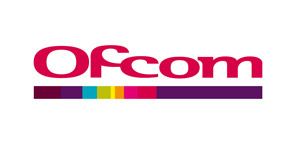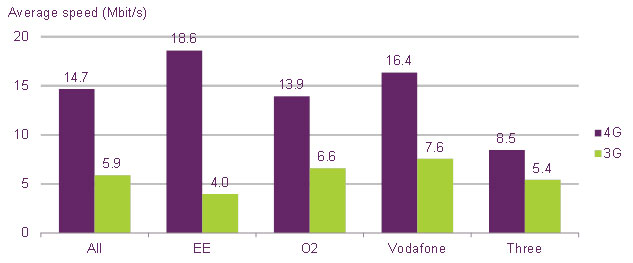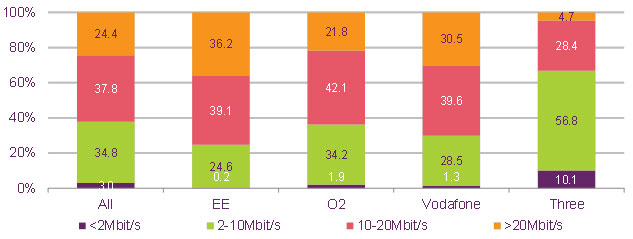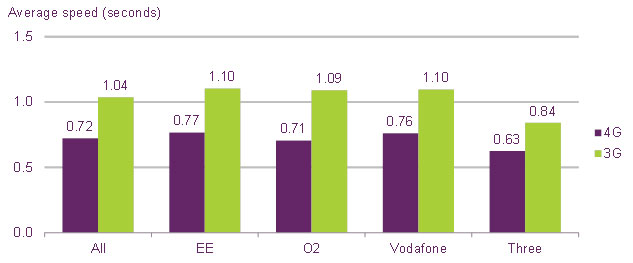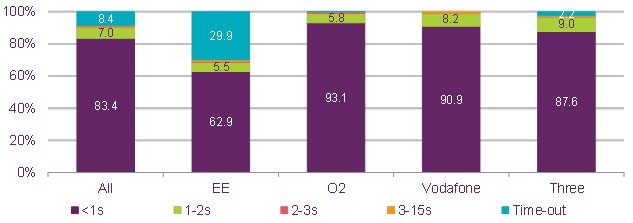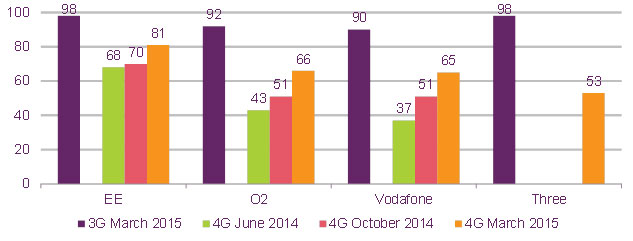The UK communications regulator, Ofcom has published new research into 4G and 3G mobile broadband performance based on 120,000 test samples collected on smartphones. The research highlighted variations in performance between the UK’s network operators, EE, O2, Three and Vodafone.
The variations were found across four key measures:
- Download speed – how quickly data can be transferred from the internet. This is most likely to affect the consumer experience when downloading very large files to a mobile device or when speed is too slow (under 2Mbit/s) to support high capacity video services.
- Web browsing speed – the time it takes to load a standard web page.
- Upload speed – the rate at which data can be transferred from the user’s device to the internet (for example, pictures, videos and other content to social media).
- Latency – measuring the delay in transferring data to and from the user’s device.
EE delivered the fastest average 4G download speed (18.6Mbit/s) and Three the slowest at 8.5Mbit/s, less than half the fastest average speed (see table below). Overall, 97% of test samples across EE, O2, Three and Vodafone provided 4G download speeds above 2Mbit/s, typically sufficient to support high capacity video services.
Three was the quickest on average for web browsing over 4G (an average of 0.63 seconds to load a web page). EE delivered the fastest average upload speed of 17.6Mbit/s. (Also see: Third RootMetrics UK Network Performance Review ranks EE top for Overall Network Performance, and New MNO benchmark puts EE top in the UK above Three, O2 and Vodafone.)
Latency was more consistent than the other measures across the 4G networks tested (an average of 53.1 milliseconds).
Ofcom’s research provides a snapshot of how 4G and 3G networks performed for EE, O2, Three and Vodafone in the five towns and cities between October and December 2014.
The Ofcom report is intended to provide information that can help consumers understand how 4G and 3G mobile networks perform and support consumers in choosing a service that best suits their needs. The findings are also expected to encourage providers to improve their performance.
Overall, 4G networks performed much better than 3G networks in five sample towns and cities tested – Edinburgh, Leeds, London, Newcastle and Poole/Bournemouth – where both 4G and 3G networks have been rolled out.
In these areas, 4G networks delivered an average download speed of 14.7Mbit/s (compared with 5.9Mbit/s on 3G) and took 0.72 seconds to load a web page (compared with 1.04 seconds on 3G). (Also see: Smartphone users demand flawless mobile data service, UK survey shows.)
4G networks performed much better than 3G networks
Mobile operators continue to invest in and expand their networks as more people take 4G services, says Ofcom.
EE’s 4G network now covers 81% of UK homes and businesses, up from 68% in June 2014. O2 and Vodafone have increased their 4G coverage to 66% and 65% respectively, up from 43% and 37% in June 2014. Three’s 4G coverage has been reported by Ofcom for the first time, reaching 53% of premises in March 2015.
The average download speed for 4G services was 14.7Mbit/s, more than twice as fast as the average 3G speed (5.9Mbit/s) across the five towns and cities tested. Web browsing was faster on 4G than 3G, taking an average of 0.72 seconds to load a standard web page on 4G, compared with 1.04 seconds on 3G.
Upload speeds for 4G services (13.6Mbit/s on average) were more than eight times faster than 3G (1.6Mbit/s on average). 4G networks had lower latency than 3G networks. Across Ofcom’s test sites, average latency was 53.1 milliseconds (ms) on 4G while on 3G it was 63.5ms.
 4G and 3G performance across networks, Q4 2014
4G and 3G performance across networks, Q4 2014
4G download speeds
The average download speed for 4G services was 14.7Mbit/s. EE delivered the fastest average 4G speed in the towns and cities tested, at 18.6Mbit/s. For Vodafone, average download was 16.4Mbit/s, O2 was 13.9Mbit/s and Three was 8.5Mbit/s.
Average download speeds, by provider, Q4 2014
Overall, 97% of test samples across EE, O2, Three and Vodafone provided 4G download speeds above 2Mbit/s, typically sufficient to support high capacity video services.
EE delivered 4G download speeds faster than 2Mbit/s in 99.8% of test samples. This compared with 98.7% for Vodafone, 98.1% for O2 and 89.9% of test samples for Three.
Proportion of test samples
Distribution of 4G download speeds by provider, Q4 2014
Web browsing on 4G
For web browsing speed, the research measured the time it took to load a standard web page. Web browsing is one of the most popular activities on 4G1. Across all 4G networks tested, average web browsing speed was 0.72 seconds.
Three had the fastest average 4G web browsing speed, taking an average of 0.63 seconds to load a web page. The average time on O2’s network was 0.71 seconds, while there was no significant difference between the 0.76 and 0.77 seconds recorded by Vodafone and EE respectively.
Average web browsing speeds by provider, Q4 2014 (lower is better)
Across all the four networks, 83.4% of test samples provided 4G page loading speeds of under one second.
However, the proportion was lower for EE (62.9%), with nearly a third (29.9%) of EE’s web browsing test samples failing to load within 15 seconds.
Proportion of test samples
Distribution of 4G web browsing speeds by provider, Q4 2014
4G upload speeds
Upload speeds are important when sharing content, such as uploading pictures and videos to social media sites.
The average 4G upload speed was 13.6Mbit/s, eight times faster than 3G at 1.6Mbit/s. EE had the fastest average 4G upload speed in the towns and cities tested, at 17.6Mbit/s, followed by O2 (13.2Mbit/s) and Vodafone (13.1Mbit/s). Three’s average 4G upload speed was 9.4Mbit/s.
EE, Vodafone and O2 delivered upload speeds faster than 10Mbit/s in over two thirds of test samples (69.7% for EE, 68.7% for Vodafone and 68.5% for O2). Less than half of Three’s upload speed test samples were faster than 10Mbit/s (47.4%).
Latency on 4G
Latency represents the responsiveness of the network, measured by recording the time a small piece of data takes to travel to a point and return a response to the user’s device. Lower latency is important for things like gaming, video calls and web browsing.
The average latency across all 4G networks tested was 53.1 milliseconds (ms), compared with 63.5ms on 3G. EE had the lowest average latency on 4G, at 48.4ms. For Three it was 50.9ms, for O2 it was 55.2ms and for Vodafone 59.5ms.
Latency on 4G was more consistent than the other measures across the mobile networks tested. Each mobile operator saw over 80% of test samples provide latency speeds within 40ms and 80ms.
Mobile coverage
The mobile market is changing rapidly as mobile operators continue to invest in and expand their networks. Coverage for 3G mobile varied between operators in March 2015, ranging from 90% to 98% of homes and businesses. For the same period, coverage of 4G varied between 53% and 81%.
Estimated 3G and 4G premises coverage by operator
Source: Ofcom estimates based on data supplied by operators. Historical data for Three unavailable.

